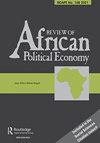采掘资本主义和硬实力与软实力在“黑人的命也重要”时代
IF 1.4
3区 社会学
Q1 AREA STUDIES
引用次数: 0
摘要
随着我们的发表,奥密克戎似乎正在衰退,但无法保证它是新冠肺炎变异株中的最后一种。事实上,医学观点似乎接受了这样一种观点,即新冠肺炎在任何变异中都可能成为地方病,并像流感一样治疗,接种疫苗是控制它的手段。然而,这并不是对奥密克戎的第一反应,而是富裕的全球北方对南非的奖励,南非首先发现了新变种,并提醒世界其他地区注意它,具有讽刺意味的是,它阻止南非人进入自己的国家。尽管医学科学家假设,大量南非人患有自身免疫性疾病和疾病,尤其是艾滋病毒/艾滋病,可能导致新冠肺炎的更多变种在那里迅速发展,但很明显,奥密克戎变种是在其他地方独立发展的。具有讽刺意味的是,禁止来自南非的游客入境,加上全球北方的“疫苗种族隔离”剥夺了南方保护本国人口的权力。尽管全球北方的预期可能是它可以与病毒共存,尽管一些国家,尤其是中国和新西兰,成功地遵循了动态清零战略,但全球南方缺乏同等水平的医疗保健,患有自身免疫性疾病,疫苗短缺,不能指望能够在没有导致进一步贫困的负面后果的情况下与病毒共存。这一切的赢家当然是大型制药公司。国际乐施会(2021)报告称,辉瑞、BioNTech和莫德纳等公司从公共资金中获得了80亿美元,同时拒绝与既没有技术也没有制造能力自己生产疫苗的全球南方国家分享他们的知识。与此同时,据报道,在疫情期间,从2020年3月到2021年11月,世界上最富有的10个人的财富翻了一番(国际乐施会2022),而非洲最富有的5个人的总财富同期增长了38.5%(《2021年非洲报告》)。这篇社论的其余部分涵盖了一些最近的事态发展,我们看到这些事态发展将塔利班在阿富汗获胜后美国和英国军队的撤离与法国在马里的撤军联系起来。我们讨论了非洲各地爆发的民事和军事冲突,重点是埃塞俄比亚、苏丹和马里,并在最后一个案例中指出,法国军队的预期撤离反映了美国和英国军队从阿富汗的撤离,即帝国大国更加强调“软”实力。我们特别关注外国援助的软实力,以及这在某种程度上取代了对阿富汗的军事介入,并打算在马里这样做。我们接着讨论英联邦的特殊情况及其在软实力传播和消除贫困方面的作用——这被视为冲突的关键原因。我们将援助和帝国主义的相关问题放在非殖民化运动和“黑人的命也是命”时代的背景下,提出了全球南方成员国在向北方施压以采取行动减少全球不平等方面的作用问题,最后简要反思了ROAPE在这一背景下的作用。本文章由计算机程序翻译,如有差异,请以英文原文为准。
Extractive capitalism and hard and soft power in the age of Black Lives Matter
As we go to publication, Omicron appears to be on the wane but there is no guarantee that it is the last of the Covid variants. Indeed, medical opinion seems to be accepting that Covid-19 in whatever variant may become endemic and be treated like influenza, with vaccinations as the means of keeping it under control. This was not the first reaction to Omicron, however, which was for the rich global North to reward South Africa, which had first identified the new variant and alerted the rest of the world to it, ironically by stopping South Africans entering their countries. While it has been hypothesised by medical scientists that the high number of South Africans with autoimmune disorders and illnesses, most notably HIV/AIDS, may have allowed more variants of Covid-19 to develop there so rapidly, it became clear that the Omicron variant had developed independently elsewhere. The irony of barring entry to travellers from South Africa was compounded by the global North’s ‘vaccine apartheid’ denying the South the power to protect their own populations. While the expectation in the global North may be that it can live with the virus, even though some countries, notably China and New Zealand, have successfully followed a zero-Covid strategy, the global South, lacking the same level of health care, with autoimmune diseases and a shortage of vaccines, cannot expect to be able to live with the virus without negative consequences leading to further impoverishment. The winner in all of this is of course Big Pharma. Oxfam International (2021) reports that corporates such as Pfizer, BioNTech and Moderna have received US$8 billion from public funds while at the same time refusing to share their knowledge with countries of the global South that have neither the technological nor manufacturing capacity to produce the vaccine themselves. Meanwhile, it is reported that during the pandemic, from March 2020 to November 2021, the 10 richest men in the world have doubled their wealth (Oxfam International 2022), while Africa’s five richest men have seen their aggregate wealth grow by 38.5% over the same period (Africa Report 2021). The rest of this section of the editorial covers some recent developments which we see connecting the withdrawal of US and UK troops, following the Taliban victory in Afghanistan, to the French withdrawal in Mali. We discuss the outbreaks of civil and military conflict across Africa focusing on Ethiopia, Sudan and Mali, noting in the last case how the intended withdrawal of French troops mirrors the withdrawal of US and UK forces from Afghanistan in the sense of the imperial powers placing greater emphasis on ‘soft’ power. In particular, we focus on the soft power of foreign aid and how that has to some degree replaced the military involvement in Afghanistan and is intended to do so in Mali. We go on to discuss the particular case of the Commonwealth and its role in the spread of soft power and combating poverty – seen as a key cause of conflict. We place the connected issues of aid and imperialism in the context of the movement for decolonisation and the age of Black Lives Matter, raise the question of the role of the member countries of the global South in pressuring the North for action to bring about a reduction in global inequality, and conclude with a brief reflection on the role of ROAPE in this context.
求助全文
通过发布文献求助,成功后即可免费获取论文全文。
去求助
来源期刊

Review of African Political Economy
Multiple-
CiteScore
3.00
自引率
7.70%
发文量
29
期刊介绍:
The Review of African Political Economy (ROAPE) is a refereed journal committed to encouraging high quality research and fostering excellence in the understanding of African political economy. Published quarterly by Routledge, Taylor & Francis Group for the ROAPE international collective it has since 1974 provided radical analysis of trends and issues in Africa. It has paid particular attention to the political economy of inequality, exploitation and oppression, whether driven by global forces or local ones (such as class, race, community and gender), and to materialist interpretations of change in Africa. It has sustained a critical analysis of the nature of power and the state in Africa.
 求助内容:
求助内容: 应助结果提醒方式:
应助结果提醒方式:


